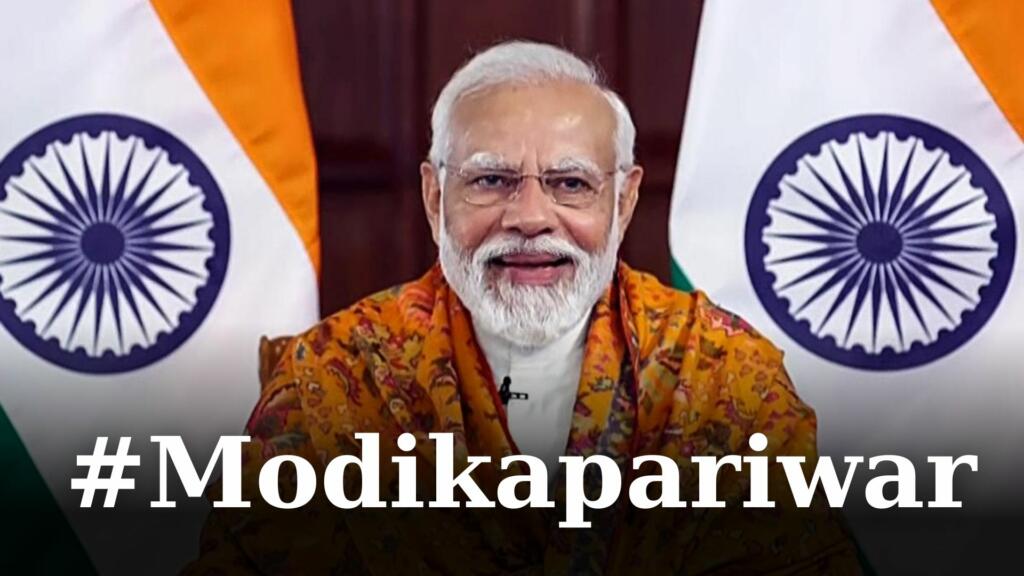In the swirling maelstrom of Indian politics, the clash between dynasty politics and the narrative of Prime Minister Narendra Modi’s leadership unfolds as a riveting saga. Recent exchanges, particularly Lalu Prasad Yadav’s biting remarks with INDIA Bloc support and the subsequent ‘Modi Ka Pariwar’ campaign launched by the Bharatiya Janata Party (BJP), have rekindled debates and stirred fervent discussions. But, This whole clash clarified the political diorama with the critiques against Lalu Prasad Yadav and the unwavering support for Narendra Modi.
Lalu Prasad Yadav & His Dynastic Dilemma
Lalu Prasad Yadav’s recent spasm against Prime Minister Modi reflects a classic tactic in Indian politics – the personal attack. Questioning Modi’s familial ties and Hindu credentials, Yadav attempts to chip away at the Prime Minister’s image. However, his remarks not only target Modi but also highlight the broader issue of dynasty politics prevalent in Indian political culture.
Yadav’s critique epitomizes the skepticism surrounding political dynasties, where familial connections often pave the path to power. In a country deeply entrenched in dynastic politics, his remarks strike a chord with those critical of this entrenched system. However, they also underscore the irony of such critiques coming from a leader deeply enmeshed in his own political dynasty, thus exposing a glaring hypocrisy in political discourse.
INDIA Bloc in Lalu’s Defence
The defense mounted by the INDIA bloc in support of Lalu Prasad Yadav’s remarks appears to be backfiring, as it inadvertently reinforces the narrative against dynastic politics. Rather than mitigating the impact of Yadav’s jibe, their defense serves to underscore the prevalence of dynasty within their own ranks, thereby lending credence to criticisms of nepotism and entitlement.
By rallying behind Yadav and attempting to deflect attention from his comments, the INDIA bloc inadvertently highlights their own complicity in perpetuating the very system they purportedly oppose. This contradiction undermines their credibility and weakens their position in the eyes of the public, particularly those disillusioned with traditional politics.
Moreover, the defense of Yadav’s remarks fails to address the substantive issues raised by his critique of Prime Minister Modi. Instead of engaging in meaningful discourse on policy or governance, the focus remains squarely on personal attacks and political theatrics, further alienating voters seeking substantive change.
Also Read: Modi-fied Uttar Pradesh: A Journey Through Innovation and Ingenuity
The ‘Modi Ka Pariwar’ Campaign
In response to Lalu Prasad Yadav’s remarks, the BJP launched the ‘Modi Ka Pariwar’ campaign, a strategic move aimed at countering the attacks and reaffirming Modi’s leadership. Top BJP leaders, including Amit Shah, JP Nadda, and Smriti Irani, appended the suffix to their names on social media platforms, signaling their solidarity with Modi.
The campaign not only serves as a defense against the accusations leveled by Yadav but also reinforces Modi’s image as a self-made leader untainted by the shadows of dynasty. It resonates with the masses, tapping into sentiments of nationalism and pride in Modi’s leadership. However, beneath the surface lies a deeper narrative, one that raises questions about the cult of personality surrounding Modi and the coexistence of meritocracy and nepotism within the BJP.
Also Read: From Kaal Chakra to Ram Rajya: PM Modi’s Vision for India’s Future
Modi’s Leadership and Dynastic Politics
The clash between Lalu Prasad Yadav’s critique and the ‘Modi Ka Pariwar’ campaign reveals a paradox at the heart of Indian politics. On one hand, Modi’s rise to power represents a departure from traditional dynastic politics, embodying the principles of meritocracy and individual achievement. His humble origins and ascent to the highest echelons of power resonate with many disillusioned with the status quo.
Yet, the BJP itself is not immune to the allure of dynasty. From prominent leaders like Amit Shah and Smriti Irani to regional stalwarts across the country, the party boasts its fair share of political dynasties. The ‘Pariwar’ extends beyond Modi to encompass a network of influential families within the party, blurring the lines between meritocracy and nepotism.
Smriti Irani pitched a blistering incursion on RJD chief Lalu Prasad Yadav and the opposition’s Indian National Developmental Inclusive Alliance (INDIA) bloc, condemning their “parivaarvad” remark aimed at Prime Minister Narendra Modi. Irani asserted that the 1.4 billion citizens of India constitute Modi’s family, emphasizing that nobody would dare to harm even a single strand of the “Pradhan Sevak’s” (PM Modi’s) hair.
Also Read: From blasts to blossoms: PM Modi’s vision transforms J&K post 370
Resilient Support for Modi
Despite these contradictions, support for Modi remains unwavering, underpinned by a cult of personality unparalleled in Indian politics. His leadership style, characterized by charisma, decisiveness, and strong nationalist rhetoric, has endeared him to millions across the country. The ‘Modi Ka Pariwar’ campaign taps into this fervent support, portraying Modi as the embodiment of the BJP’s ideals and aspirations.
However, the elevation of Modi as the sole emblem of the BJP’s narrative risks overshadowing the collective efforts of the party. Politics is a team sport, reliant on collaboration and consensus-building. By centering the narrative around Modi alone, the BJP risks alienating other stakeholders within the party and diluting its broader message.
In conclusion, the clash between Lalu Prasad Yadav’s critique and the ‘Modi Ka Pariwar’ campaign encapsulates the complexities of Indian politics. While Modi’s rise to power symbolizes a break from traditional dynastic politics, the persistence of dynastic influences within the BJP underscores the inherent contradictions within the political system. Despite these challenges, support for Modi remains resilient, fueled by a cult of personality and nationalist fervor. As India gears up for the upcoming elections, the discourse surrounding Modi’s leadership and the specter of dynasty politics will continue to shape the political landscape, shaping the future trajectory of Indian democracy.
Also Read: Lighting Up India: PM-Surya Ghar’s Free Electricity for One Crore Homes
